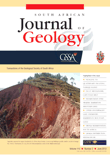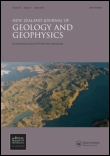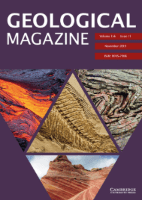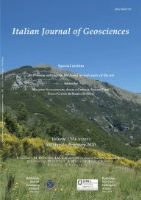
Geological Field Trips and Maps
metrics 2024
Mapping the Future of Geology with Insight and Precision
Introduction
Geological Field Trips and Maps is a pivotal journal published by IST SUPERIORE PROTEZIONE & RICERCA AMBIENTALE-ISPRA in Italy, dedicated to advancing the field of geological sciences through practical applications and systematic exploration. The journal, which operates under the ISSN 2611-6189, focuses on providing valuable insights through geological maps and field trip reports, enriching both academic research and practical understanding of geology. Despite not having an Open Access option, it presents an opportunity for researchers and professionals to engage with peer-reviewed content that navigates through essential topics such as economic geology, stratigraphy, and planetary change, where it holds respectable quartile rankings, including Q3 in Economic Geology and Q4 in Global and Planetary Change as of 2023. Between 2018 and 2024, this journal aims to foster collaboration and knowledge-sharing among geologists, making it an invaluable resource for anyone vested in the exploration of Earth's complex systems.
Metrics 2024
 0.22
0.22 1.20
1.20 0.80
0.80 4
4Metrics History
Rank 2024
Scopus
IF (Web Of Science)
JCI (Web Of Science)
Quartile History
Similar Journals

SOUTH AFRICAN JOURNAL OF GEOLOGY
Fostering collaboration in the vibrant field of geology.The South African Journal of Geology (ISSN: 1012-0750, E-ISSN: 1996-8590) is a prestigious academic journal published by the Geological Society of South Africa, dedicated to advancing research and knowledge in the field of geology. Established in 1987, this journal has become a cornerstone for geoscientists, featuring a diverse range of studies that address key geological phenomena, particularly within the South African context. With its current quartile ranking of Q2 and an impressive Scopus rank placing it in the 70th percentile among Earth and Planetary Sciences, the journal is recognized for its significant contribution to the discipline. As researchers and professionals across the globe seek to explore and understand geological processes, the South African Journal of Geology stands out as an essential resource, fostering collaboration and innovation in geoscientific research.

NEW ZEALAND JOURNAL OF GEOLOGY AND GEOPHYSICS
Pioneering Interdisciplinary Discoveries in Earth Sciences.NEW ZEALAND JOURNAL OF GEOLOGY AND GEOPHYSICS, published by Taylor & Francis Ltd, stands as a prominent forum dedicated to the interdisciplinary exploration of geological and geophysical phenomena. With an impact factor that situates this journal in the prestigious Q1 category across key subjects—namely Earth and Planetary Sciences, Geology, and Geophysics—it is a critical resource for researchers, professionals, and students alike. The journal has been operational since 1958 and continues to contribute valuable insights into the complexities of the Earth's processes. Although it does not currently offer Open Access options, its broad readership benefits from an extensive archive of high-quality research findings that span from 1958 to 2024. Located in the United Kingdom, the journal remains a pivotal player in advancing the understanding of Earth's systems, making significant contributions to both academic inquiry and practical applications in the field.

NORWEGIAN JOURNAL OF GEOLOGY
Exploring Earth's Mysteries, One Article at a Time.NORWEGIAN JOURNAL OF GEOLOGY, published by the Geological Society of Norway, stands as a vital resource in the fields of geology, geochemistry, petrology, geophysics, oceanography, and paleontology. Since its transition to an Open Access model in 2015, this journal has significantly expanded its reach, allowing for greater dissemination of cutting-edge research and insights. With an ISSN of 2387-5844 and E-ISSN of 2387-5852, the journal is committed to fostering collaboration and knowledge exchange among the scientific community. The journal's categorization in the Q3 quartile across various Earth and Planetary Sciences fields underscores its status as a reputable publication, offering researchers, professionals, and students alike a platform to share their findings and advancements in geology. Continuing through its converged years from 2015 to 2024, the NORWEGIAN JOURNAL OF GEOLOGY plays a crucial role in enhancing our understanding of Earth's processes and materials, making it an important reference for anyone engaged in geoscientific research.

JOURNAL OF IBERIAN GEOLOGY
Fostering innovation in stratigraphy and geological studies.JOURNAL OF IBERIAN GEOLOGY, published by Springer International Publishing AG, is a pivotal platform dedicated to advancing the field of geology and stratigraphy. With an ISSN of 1698-6180 and E-ISSN of 1886-7995, this journal has earned its reputation in the academic community, holding a commendable Q2 ranking in both Geology and Stratigraphy for 2023, reflecting its contributions to contemporary geological research. Spanning from 2007 to 2024, it provides a comprehensive forum for scholars and practitioners from around the globe to disseminate their findings pertaining to the Iberian Peninsula, enhancing the understanding of regional geological phenomena. The journal has carved out a significant niche within the Earth and Planetary Sciences, ranking #137 out of 321 in Geology and #24 out of 55 in Stratigraphy, indicating its wide-reaching impact and scholarly engagement. The Journal of Iberian Geology serves as an indispensable resource for those interested in the complexities of geological structures, stratigraphic sequences, and the broader implications of geological research, making it a vital reference for researchers, professionals, and students alike.

Geologos
Connecting Scholars Worldwide to the Heart of Earth ScienceGeologos is a peer-reviewed journal dedicated to advancing knowledge in the field of Earth and Planetary Sciences. Published by SCIENDO, this Open Access journal has been facilitating unrestricted access to research findings since 2009, ensuring that scholars, professionals, and students can engage with up-to-date scientific discourse without barriers. With an ISSN of 1426-8981 and an E-ISSN of 2080-6574, Geologos is indexed in Scopus, where it currently holds a rank of #111 out of 195 in the General Earth and Planetary Sciences category, reflecting its commendable impact within the discipline. Based in Poland, the journal embraces contributions from international authors, promoting a diverse and inclusive dialogue on topics ranging from geological phenomena to planetary processes. As a Q3 journal in the Earth and Planetary Sciences category, Geologos is committed to enhancing the understanding and appreciation of the Earth's systems, making it an essential resource for those engaged in research and practice within this dynamic field.

China Geology
Your Gateway to Cutting-Edge Geological ResearchChina Geology, published by KEAI PUBLISHING LTD, is a leading open-access journal that serves as a pivotal platform for disseminating high-quality research across a wide spectrum of Earth sciences. Since its inception in 2018, the journal has rapidly established itself with an impressive Q1 ranking in multiple critical categories, including Geology, Economic Geology, and Oceanography, among others, reflecting its significant contribution to the academic community. Positioned as a top-tier journal in the Earth Planetary Sciences domain, it ranks #22 out of 321 in Geology and exhibits an admirable impact in sub-fields such as Earth-Surface Processes and Geochemistry and Petrology. China Geology is committed to promoting rigorous scientific inquiry and facilitating the open exchange of knowledge in the geosciences, making it an essential resource for researchers, professionals, and students eager to explore innovative developments and fundamental advances in geology. The journal’s accessibility ensures that critical findings reach a broad audience, thereby enhancing collaboration and driving forward scientific discourse in the global community.

Geosphere
Transforming Geological Insights into Global ImpactGeosphere is a premier open access journal published by the Geological Society of America, Inc., dedicated to advancing the fields of geology and stratigraphy. Since its inception in 2005, this journal has established itself as a critical platform for sharing high-quality research, evidenced by its robust positioning in the 2023 Scopus rankings, where it holds the 12th rank in stratigraphy and 75th in geology. With an impressive impact factor and a commitment to open access since 2018, Geosphere facilitates the dissemination of significant findings to a global audience, making it an essential resource for researchers, professionals, and students alike. The journal's scope includes a wide range of topics related to Earth and Planetary Sciences, encouraging interdisciplinary collaboration and innovation. Based in the United States, Geosphere continues to foster a community dedicated to understanding the Earth's processes and resources, ensuring that it remains at the forefront of geological research.

GEOLOGICAL MAGAZINE
Pioneering Discoveries in Earth and Planetary SciencesGEOLOGICAL MAGAZINE, published by Cambridge University Press, is a premier journal in the field of geology, renowned for its rich legacy since 1864 and ongoing contributions to Earth and Planetary Sciences. With an impressive Q1 ranking in Geology and a Scopus rank of #70 out of 321 journals, it holds a significant position within the academic community, appealing to researchers, professionals, and students alike. The journal covers a wide array of topics, ensuring a comprehensive platform for the dissemination of cutting-edge geological research. Although it does not offer open access, it remains a vital resource for those seeking to stay abreast of advancements in the field. With an enduring commitment to quality, GEOLOGICAL MAGAZINE stands as an essential outlet for scholarly communication and serves as a catalyst for academic discourse within the geological sciences.

STRATIGRAPHY AND GEOLOGICAL CORRELATION
Charting the Course of Geological DiscoverySTRATIGRAPHY AND GEOLOGICAL CORRELATION is a prominent scholarly journal published by PLEIADES PUBLISHING INC, featuring a dedicated focus on the fields of geology, stratigraphy, and paleontology. With ISSN 0869-5938 and E-ISSN 1555-6263, this journal has been disseminating significant research findings since its inception in 1994, continuously contributing to the academic discourse through 2024. Despite not currently offering open access, its relevance is underscored by its Category Quartiles for 2023, where it has established itself as Q3 in Geology and Paleontology, and Q2 in Stratigraphy. STRATIGRAPHY AND GEOLOGICAL CORRELATION ranks #29 out of 55 in Stratigraphy and #186 out of 321 in Geology according to Scopus metrics, positioning it within the competitive landscape of Earth and Planetary Sciences. Researchers, professionals, and students are invited to engage with the journal’s content to deepen their understanding and foster innovation within these critical areas of study.

Italian Journal of Geosciences
Connecting Scholars: A Gateway to Earth and Planetary SciencesItalian Journal of Geosciences, published by the Società Geologica Italiana, is a distinguished platform for the dissemination of research in the fields of Earth and Planetary Sciences and Geology. With an impressive impact factor reflected in its 2023 rankings, where it placed in the Q3 category across its related fields, this journal serves as a vital resource for academics, practitioners, and students. Established in 2010 and poised to continue until 2024, the journal showcases critical advancements and interdisciplinary studies that deepen our understanding of geological processes and Earth systems. Operating under open access options, it offers robust accessibility to a broad audience, facilitating wider dissemination of knowledge. The journal's affiliation with Università degli Studi La Sapienza in Rome, Italy, further underscores its commitment to academic excellence and innovation in geosciences.